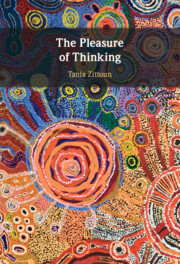Book contents
- The Pleasure of Thinking
- The Pleasure of Thinking
- Copyright page
- Dedication
- Contents
- Figures
- Foreword
- Chapter 1 The Pleasure of Thought
- Chapter 2 On the Emergence of Pleasurable Thinking
- Chapter 3 Thinking the Pleasures with Psychoanalysis
- Chapter 4 Thinking in Sociocultural Psychology
- Chapter 5 Thinking through the Psyche
- Chapter 6 The Pleasure of Thinking in Diverse Experiences
- Chapter 7 Trajectories of Pleasures in Thinking
- Chapter 8 Thinking Forward
- Notes
- References
- Index
Chapter 5 - Thinking through the Psyche
Published online by Cambridge University Press: 05 October 2023
- The Pleasure of Thinking
- The Pleasure of Thinking
- Copyright page
- Dedication
- Contents
- Figures
- Foreword
- Chapter 1 The Pleasure of Thought
- Chapter 2 On the Emergence of Pleasurable Thinking
- Chapter 3 Thinking the Pleasures with Psychoanalysis
- Chapter 4 Thinking in Sociocultural Psychology
- Chapter 5 Thinking through the Psyche
- Chapter 6 The Pleasure of Thinking in Diverse Experiences
- Chapter 7 Trajectories of Pleasures in Thinking
- Chapter 8 Thinking Forward
- Notes
- References
- Index
Summary
Thinking is an activity that has a trajectory. Through the previous chapters, five modalities of pleasure of thinking have been identified: (i) a core and fundamental curiosity; (ii) a semiotic activity of binding experience in more or less complex wholes, or functional pleasure; (iii) the occasional joy of finding a solution thanks to our background capacity to engage in relatively free semiotic explorations, that is, the pleasure of discovery; (iv) the dialogical pleasure of the shared activity of thinking; (v) the awareness of the activity and its pleasure, a meta-pleasure. These five aspects can be experienced in a more or less playful way and lived more or less bodily – in modulations that partly depend on the actual setting as well as on cultural norms and guidance. Chapter 5 proposes a model of the person to account for such trajectories of thinking. It first emphasises four principles we need to hold about mind based on our exploration; it then proposes an integrated model of mind; and it finally qualifies trajectories of thinking and their pleasures.
Keywords
- Type
- Chapter
- Information
- The Pleasure of Thinking , pp. 147 - 163Publisher: Cambridge University PressPrint publication year: 2023

